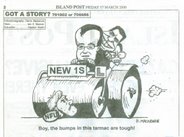Fuel tax regulator
The graph of oil prices over the past six months is instructive
(Graphic removed, as it wasn't working and a link put in its place)
So how does this tie in with the calls for a fuel duty regulator?
As you know I have been very sceptical about the usefulness of the such a proposal, considering it to be daft, ill thought-out, and pushed by under-informed politicians.
In April this year (when oil reached $110) the cry was for a regulator to soften the impact of the expected continual increase in fuel prices. I asked the simple question - which remains unanswered - at what price should the duty rate be set?
"It's too high", is hardly and informed and intellectual response to that question, and betrays the lack of understanding of the speaker.
With prices now heading downwards, if a fuel duty regulator had been put in place when our MP and MSP made their siren calls then we would be facing petrol prices that were kept artificially HIGH to ensure that the yield from fuel duty remained the same.
I am sure that this outcome is not one that MacNeil or Allan realised they were actually campaigning for when they tried to grab the headlines.







5 comments:
So our MSP is campaigning to reduce the local cost of an essential resource, for local people? Good. That's what he's supposed to do.
Unlike the previous MSP, who did a jobshare with the invisible man. Only reappearing here a few months before the election, to bombard us with literature about the great things he and his party had allegedly done. Didn't work; locals have long memories. AlMo? AlWho, more like.
Whether we needed a Fuel Tax regulator I confess to having no idea I read various arguments for and against, including yours Angus, and I'm still confused as to what it would or would not achieve.
What we do need though is someone to look at Oil Speculators and the role they play in keeping the price of oil artificially high. The profits that the Oil Companies including the retail outlets make also need to be looked into, and it is no use to me the Goverment imposing a windfall tax which will only go into the Goverments coffers, how will this reduce my heating and travel costs?
Just found this compare the prices on this graph with that of the front page. By my reckoning given the fall of oil prices back to a level of last May then petrol and diesel should have done the same, therefore we should be paying around £1.10 max. I'm sure though that those who understand these things better than I, and I'm sure there are many, will tell me why that can't be so. I'll be please to hear from them.
What goes up must come down, but with fuel prices it doesn't quite work like that!
Good grief Angus stay away from oil you are truly out of your depth.
It is NOT the MP or the MSP's job to reduce the cost of fuel. The cost of fuel is determined by the market, which is dependent on supply and demand. Over the last few months supply has fallen, or more accurately, the market expected that supply would fall, therefore as demand for each barrel produced is higher so is the price.
Also the high price of $140-$150 paid for oil last month has not yet been delivered and will therefore not be "at the pump" for a number of weeks yet, in other words the price of petrol will increase over the coming weeks. Oil is usually priced based on delivery in two months.
I personally think the price of crude will reach $200 this decade: problems with supply in Africa are not going away any time soon and the threat of conflict with Iran as well as the current situation in the former Soviet Union will all support higher prices.
As the second largest investor in Russia, it is worrying that BP are being f#*ked about like they are and it looks like the Kremlin will have full control over Russian oil and gas. This of course will mean that they will have more ability to dictate prices.
The lower cost is most likely just a medium-term market correction, though as with all markets no-one can know for sure.
Post a Comment